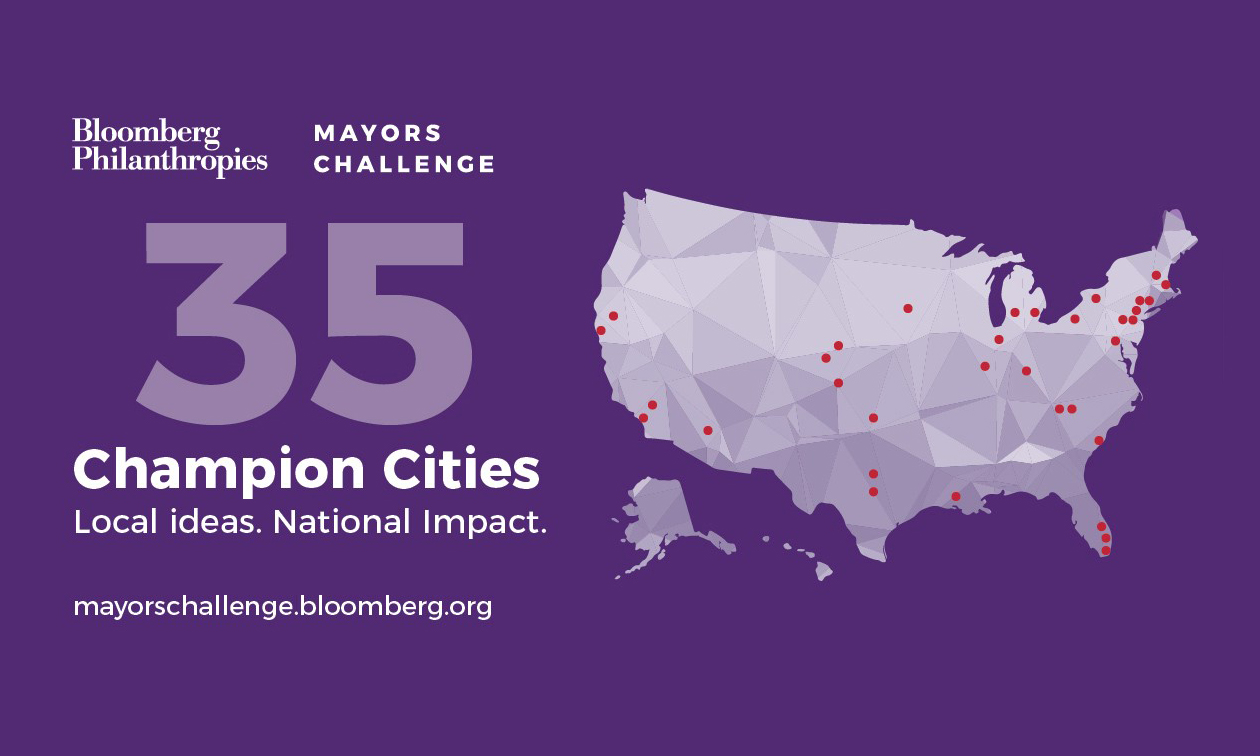
Follow the Data Podcast Episode 17: Rwandan Women Rebuilding Their Lives – Brick by Brick
March 6, 2018
Our newest episode of Follow the Data features a conversation between Verna Eggleston, who leads Bloomberg Philanthropies’ Women’s Economic Development program, and Joy Rwamwenge, the director of the Women’s Opportunity Center in Kayonza, Rwanda. And at the end of the show, we also speak with Laurie Adams, the President and CEO of Women for Women International, tells listeners how to get involved with the organization.
Women for Women International opened its Women’s Opportunity Center in Kayonza in 2013. The facility is a six-classroom campus, with a bed & breakfast, restaurant, community garden and a local coffee café. The goal of the center aligns with the Rwanda government’s overarching 2020 vision – to create new economic opportunities and strengthen social infrastructure for rural women. By bridging the gap between urban buyers and rural farmers, the center provides space for education, business development, entrepreneurial activities, and networking.
Read more
Winning the Fight Against Big Tobacco
February 26, 2018
By Dr. Kelly Henning, Bloomberg Philanthropies’ Public Health lead
Tobacco use is responsible for more than seven million deaths each year worldwide. While that number is shocking, these deaths are preventable if governments and philanthropy work together to combat the tactics of Big Tobacco. On March 7th, the 17th World Conference on Tobacco or Health, the premier international forum on tobacco control, will gather public and private sector officials from more than 100 countries to advance this ongoing fight.
Read more
Follow the Data Podcast Episode 16: The Innovative Mayor, Michael Hancock
February 23, 2018
The 16th episode of Follow the Data presents a conversation with Denver Mayor Michael Hancock and James Anderson, who leads Government Innovation at Bloomberg Philanthropies. Mayor Hancock is a native Denverite, serving his second term. He is known as a “mayor’s mayor,” surrounding himself with a talented team, and concentrating on efforts to make government more effective, to better serve its citizens.
At Bloomberg Philanthropies, we’ve been fortunate to work with Mayor Hancock and the City of Denver in a variety of ways. Denver was an early member of What Works Cities, our initiative committed to helping cities better manage data to improve people’s lives. Mayor Hancock is one of the first 40 mayors to participate in our collaboration with Harvard University to give mayors high-quality executive coaching and training that rivals what is available to their CEO peers in the business world.
Read more
Five ways U.S. cities are solving America’s biggest challenges
February 21, 2018
By Anne Emig, Bloomberg Philanthropies Government Innovation team
Thirty-five U.S. cities, from as large as Los Angeles, Calif., and as small as Ithaca, N.Y., are about to launch into an unprecedented experiment to solve some of our country’s biggest challenges. Each of these finalists—or “Champion Cities”—in the 2018 Mayors Challenge will spend the next six months testing and refining their big ideas for tackling everything from opioid addiction to climate change. And while only five cities will win prizes later this year—including one $5 million prize and four $1 million prizes—all will walk away winners, and that much closer to solving some of our cities’ toughest concerns.
Read more
The Mayors Challenge: Unleashing the Power of Public Prototyping
February 21, 2018
By James Anderson, Bloomberg Philanthropies Government Innovation team
Just about every successful business prototypes new solutions before bringing them to market. Amazon, Apple, Walmart, CVS Health, Ford, and Tesla—to name just a few—have successfully launched new products or entered new markets by tapping this tried-and-true product development technique.
Yet it’s a concept that is virtually unknown within the public sector, where the stakes for innovation are highest. Just ask any police chief. Actual lives depend on cities’ ability to constantly innovate new and better approaches.
Read more
Public Art Challenge pushes cities to see art as a tool for change
February 15, 2018
By Anita Contini, Bloomberg Philanthropies Arts Team
When Spartanburg, S.C., embarked on an ambitious public art project a few years ago, it was the police department that took the lead. And while police aren’t typically the first officials people turn to for matters of artistic expression, in this case the department was a perfect fit.
Read more
Data-driven women to watch
February 7, 2018
By Beth Blauer, Executive Director and Founder of GovEx at Johns Hopkins University, and Simone Brody, Executive Director of What Works Cities
One of the biggest misconceptions about the field of data science is that it’s all about the numbers. But, as anybody in our business will attest, statistics and spreadsheets don’t mean a whole lot if you don’t also understand the people, the problems, and the promise they represent.
Our work has never been “all about the numbers.” It is, however, increasingly about the number — and the diversity — of life experiences our teams bring to the table that deliver big and important impact in cities. Currently, women represent only 25 percent of the data scientists in the public and private sectors. But as two women who lead What Works Cities — Michael Bloomberg’s investment to help 100 U.S. cities expand upon the data and evidence work he pioneered in New York City Hall — we can tell you that there is a growing number of women at the table.
Read more
Follow the Data Podcast Episode 15: The Innovative Mayor, Jan Vapaavuori
February 6, 2018
The 15th episode of Follow the Data presents a conversation with Helsinki Mayor Jan Vapaavuori and James Anderson, who leads Government Innovation at Bloomberg Philanthropies. Mayor Vapaavuori is a former member of the Helsinki City Council and served in Finland’s Parliament for more than a decade.
The Mayor took office last June during Bloomberg Philanthropies’ work with Helsinki as part of an effort to help cities better determine the future of autonomous vehicles and harness the technology to address urban challenges. He is the first person to lead the city in the wake of a significant set of reforms to Helsinki’s organizational structure. Additionally, he has an ambitious goal: to make Helsinki the world’s “most functional city.”
Read more
The mayor behind Kansas City’s data revolution
January 25, 2018
By Sly James, Mayor of Kansas City, Missouri
When I became Mayor of Kansas City in 2011, residents were eager to see local government become more efficient, accountable, and responsive to their needs. They didn’t want rhetoric. They wanted facts. And they deserved to see progress.
That’s why we started KCStat that December. It’s a data-driven strategy for improving city services. Each month, City Manager Troy Schulte and I hold a meeting during which staff in charge of different services—from public safety to economic development to transportation— present metrics on what’s going well and what’s not going so well. We ask tough questions, demand good answers, and expect to see progress by the next meeting.
Read more
Insights from Indonesia: Protecting Our Coral Reefs
January 22, 2018
By Antha Williams, Head of Environmental Programs, Bloomberg Philanthropies
Our oceans program, like all of our work at Bloomberg Philanthropies, aims to ensure better, longer lives for the greatest number of people. So it’s good news that the United Nations International Coral Reef Initiative has declared 2018 the International Year of the Reef. Coral reefs are home to one in every four fish in the ocean, and are a critical backbone of ocean ecosystems. Unfortunately, climate change threatens to destroy 90 percent of reefs in the next three decades. And as the demand for fish continues to grow, overfishing and destructive practices, like bottom-trawling and using bombs and cyanide for fishing, are damaging coral reefs.
Read more